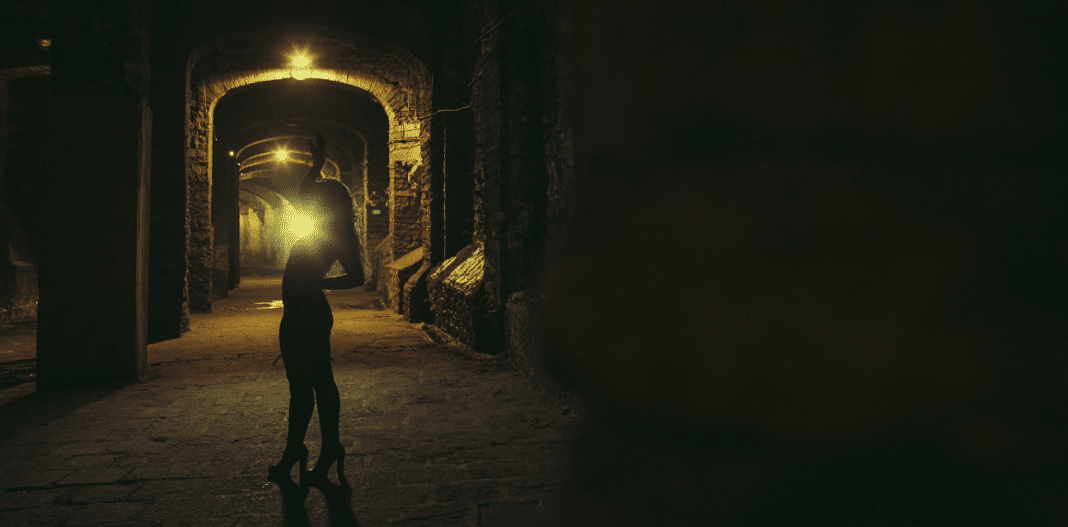Photo: Press (Demian Licht)
When Luz González sets her mind on something, there’s no way to stop her. Still a teenager, she moved from her hometown to Mexico City in order to studio audio engineering. Under her Demian Licht guise, González has rapidly made a name for herself internationally with a slew of releases she put out through her own Motus label. The certified Ableton trainer’s rough approach to Techno is heavily politically charged and in fact, González does not mince words when it comes to the subjects which inform her work. Unsurprisingly, also her contribution to our Groove podcast is as much a conceptual mix as it is a statement.
Apart from discovering the Chemical Brothers in your teenage years, you have mentioned German Krautrock acts like Can or Klaus Schulze as important for your musical development. What draws you to this specific sound?
Chemical Brothers and Krautrock was my main inspiration when I discovered electronic music as a teenager, since a couple of years I have been following specific labels such as raster-noton, Northern Electronics, Mute Records and Stroboscopic Artefacts. I have had the pleasure to meet the label heads of these platforms and to share the stage with a couple of them. I have learned a lot from those gentlemen. But I think mainly my sound aesthetic has emerged for my deep interest in cinema which I will be exploring further in upcoming projects. Tarantino, Lynch, and Kubrick to mention a couple of them. I visualise my albums as scripts to develop stories sonically. Synesthesia.
You are an Ableton Certified Trainer. How did you come to hold this position and what does it entail?
I taught electronic music production before I became an Ableton Certified Trainer, I did it for around eight years starting almost as a teenager. Last year, I stopped giving workshops because at this moment I feel I have developed the skills to be able to reach the next level with this position. Now by using Ableton I am trying to help other artists to develop their own sound, concept, and aesthetics as a co-producer rather that just teaching them how to use the platform.
While most people will automatically assume that this makes you a laptop producer, you are actually working with a lot of analogue modular systems as well. What got you into modular synthesis and which instruments specifically are you using?
I have discovered the real modular field in my travels to Berlin at Schneiders Laden where I used to go there every time when I was in the city to play with the machines and to hang around with the amazing crew from which some now are friends. I remember once I had a coffee with Andreas Schneider, the founder of this magical place, for an interview. So, evidently it’s there where I got my semi-modular synthesizer Doepfer Dark Energy II which is perfect for performing live. But to be honest, I am not a producer interested in buying all these machines even if they are amazing tools for sound design purposes. I am more into sound treatment and concepts. I am using modular synthesis within Native Instruments Reaktor which is also an amazing tool for sound design and more affordable for the Latin American economy.
In a manifesto on the – no longer online – homepage of your label Motus you have referred to technology as the carrier of revolution. How do you imagine our world after that revolution?
Firstly, I visualise humans interacting with technology in a more conscious way by reaching a balance between our connection with the earth and taking advantage of technological advancements for our evolution. Secondly, I would like to see no labels anymore in terms of gender, nationality, or religion, which has been one of the main factors for world wars in human history. Lastly, by using all the technological advancements that already exist and the ones developing, I would like to see humanity to be able to connect and going further with all the powers that we have by nature such as intuition, clairvoyance and telepathy, which are skills that through the years have been slowly erased because of our inappropriate interaction with technology and worldwide media. I think this could be a path to be able to know and interact with all that is happening beyond our planet, our solar system, our galaxy.
Through Motus, you have so far released two instalments of your Female Criminals series whose artwork displays actual female criminals. What is the concept behind the trilogy?
Female Criminals has been my script to sonically explore the dark side, the savage, the sexual, the intuitive and mystical side of the female mind. Naturally female skills that have been stigmatised and “forbidden” by society for centuries, blocking the real power and the mission of females.
The first Female Criminals has already been remixed by Brazilian and Mexican artists like AAAA. How would you characterise your relationship with the scene in Latin and South America?
Pretty diverse. I have producer friends from Mexico, Columbia and Brazil involved in electronic music, but I also am very interested in other scenes. For instance, I have friends in very prolific bands within the Garage, Rock and Psychedelic scene in Mexico such as The Risin’ Sun and Les Butcherettes as well as having made strong connections with the Argentinian underground Punk scene, the Cuban Hip Hop scene. I even met one the main avant-garde music collectors in Chile when I was living there for a while a couple of years ago.
You are known for approaching your mixes conceptually. What was the idea behind your contribution to our Groove podcast?
Yes, conceptual thinking is very important within my work. For this mix, I have selected music by female producers whose work has touched me deeply. I decided to mixed them along the narrative of my recent release Female Criminals Vol. 2: “A crime made by a woman from the desire to the act”. I have done it as a kind of tribute to all them and the inspiration their work has been provided for me.
Last but not least: Where can we see you behind the decks in the near future and what are your plans as a producer and label owner?
I will be touring in Europe this summer and autumn. I am in the process of confirming several dates around the continent, but for now I can only talk about my performance at Dour Festival in Belgium on Saturday, July 15th where I will present my new A/V show. Regarding upcoming projects, I am starting a subsection of Motus called Motus Films because, as I have said earlier, I have an strong affiliation with cinema so it was time to take that further. I am challenging myself within the film production field as I want to have powerful cinematic aesthetics in my video clips. Last year, I have started to collaborate with creators of the new wave of cinema in Mexico, we have done a first project at the Soviet Memorial in Berlin for my “Domina” track from Female Criminals Vol. 1. Very recently, we have filmed a new video clip for Vol. 2 at a sacred town in Mexico called Guanajuato in which by the way I am starting to prove my skills as an actress. It’s going to be released soon, so be prepared!
Stream: Demian Licht – Groove Podcast 106
01. Demian Licht – Crimen (Motus Records)
02. Amelia Lens – Exhale (Lyase Recordings
03. Charlotte de Witte – Sehnsucht (Turbo Recordings)
04. Demian Licht – Impetus (Motus Records)
05. Dasha Rush – Stand Alone (Fullpanda Records)
06. Ellen Allien – Not Alone (B Pitch Control)
07. Magdalena – 11-11 (Broken Mind Recordings)
08. Rebekah – The Riddle (Soma Records)
09. Demian Licht – Excitatio (Motus Records)
10. Nina Kraviz – I believe I can fly (Trip)
11. Paula Temple, Rrose, Aïsha Devi, SØS Gunver Ryberg – DR2-3 (Noise Manifesto)
12. Rrose – Pentagons (Eaux)
13. Kyoka – Rollin’ & Tumblin’ (Raster-Noton)
14. Demian Licht – Persecutionem (Motus Records)
15. Helena Hauff – Sworn to Secret Part II (Werkdiscs/Ninja Tune)
16. Demian Licht – Fuga (Motus Records)





